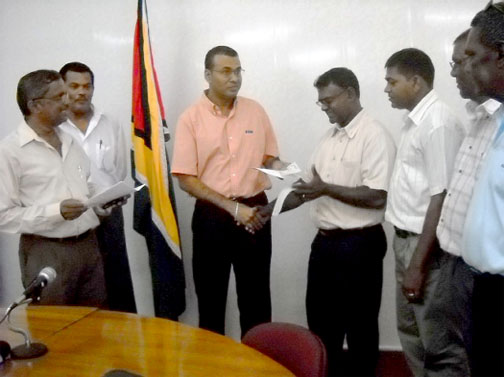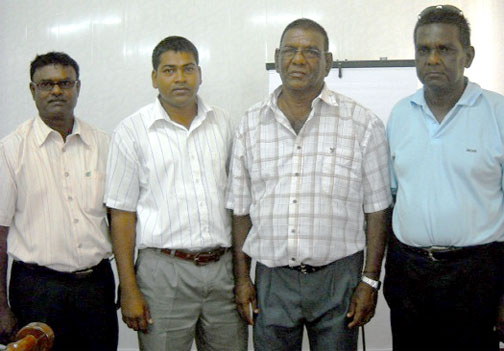Minister of Agriculture Robert Persaud yesterday handed over more than $136M to the Region Two Farmers’ Group for paddy supplied under a deal recently inked with Venezuela.
Two cheques were presented to the group’s secretary and other members at the Ministry of Agriculture. These represent payments for 2061 tonnes of paddy the group supplied under the Venezuela deal for the first two shipments.
Persaud described the groups’ endeavours as revolutionary and a great show of leadership. This is the first time, he stressed, that farmers are exporting rice directly to any territory without going through a middle man like a miller or another exporter.
His ministry, he explained, took the time off to make a public payment to the Region Two Farmers’ Group because it is “an experiment” and because it is important that stakeholders see that the Ministry of Agriculture and other support groups are committed to providing suppliers with timely payments.
Within days of the second shipment being sent to Venezuela, Persaud pointed out, the group is receiving a majority of the payment for their paddy. The $136M paid to them yesterday represents 90 percent of the total sum owed. The other 10% of payment, Persaud explained, will be made to the group over time.
Region Two, according to the minister, is an area with it own challenges. It is the first area to begin harvesting every crop. The farmers’ group, Persaud further noted, will be supplying a total of 5 000 tonnes of paddy under the current Venezuelan deal.

In late August, the Ministry of Agriculture signed a second rice agreement with Venezuela. The contract is worth US$38M and will see 50 000 tonnes of paddy and 20 000 tonnes of white rice being shipped to Venezuela. Shipping commenced last month.
Under the deal, suppliers are being paid US$420 per tonne of paddy and US$700 per tonne of white rice. These prices, Persaud had said, are about 75% more than those offered at other markets. However, Guyana is indirectly paying itself for rice and paddy supplied from payments to Venezuela for oil supplied under the PetroCaribe deal.
Despite this, Persaud insisted yesterday that things have been very bright in the rice industry. Guyana, he said, has exported about 263 000 tonnes of rice and paddy so far for this year.
He also said that the ministry would like to dispel the notion of “those who suggest they [farmers] aren’t benefitting” from the Venezuelan deal. Farmers, he insisted, are benefiting and they are being given all the support they can have from the Ministry of Agriculture and its support agencies.
Stabilizing the price
Secretary of the Region Two Rice Farmers’ Group, Ganga Persaud said that they have been getting maximum support from the Guyana Rice Development Board (GRDB).
The aim of the group was never to make a huge profit, he said. Rather, when farmers decided to form the group their main objective was to stabilize the price for paddy. Ganga, speaking on behalf of the group, said they believe that they have been able to achieve this aim.
The group is paying farmers $3 300, $3 200, $3 100 and $3 000 for extra A grade, A grade, B grade and C grade paddy, respectively. Prior to these prices being paid, Ganga said, paddy had dropped to low prices of $2,000 or below per bag. Since the deal, he said, prices have climbed to $3000 and above.
Region Two, he said, has always tried to take the initiative and move on with their activities as early as possibly. Already, Ganga said, the region is about 30 percent prepared for cultivation of 2011’s first crop.
Farmers in the region, according to Ganga, will continue to support the Venezuela deal. It is feasible supplying under the deal in terms of the prices being offered, he added. He reiterated that making a maximum profit was never the aim of the group and whatever profit is made will be shared among the farmers.
Not satisfied
The group’s Treasurer Shamlall Dindial, Chairman, Sewnaraine Seecharan and Executive Committee Member Tameshwer Romnauth were also present at the presentation of the cheques.

As a farmer, Romnauth told Stabroek News, he is not satisfied with the profit the group is making. He admitted that expenses incurred for preparing and shipping the paddy to Venezuela have been high.
A source in the industry had told this newspaper last week that even with the middleman cut out, the group may not make a significant profit. In addition to paying costs for cleaning and drying the paddy, the farmers’ group will also incur expenses of export commission, freight, wharfage, fumigation, quality control and any demurrage accumulated locally. The group, the source had said, is being treated like any other exporter.
Later when this newspaper spoke with General Secretary of the Guyana Rice Producers’ Association (GRPA) Dharamkumar Seeraj he’d said that the group was paying a “small toll” of $600 per bag to have the paddy cleaned and packed.
However, Romnauth and his colleagues said that $600 is not a “small toll”. Cleaning and drying paddy at that cost is very expensive and the obvious result is that it is cutting back on the profit the group can make on the shipment, Romnauth said.
He further noted that because there was demand for the vessel which was used to ship the paddy, the shipping price automatically went up because millers opted to pay more for the service. This too has weighed heavily on the group’s expenses, he said. “We are small fishes swimming among the big fishes in the boat.”
Romnauth also said that the high price of $3 500 which Seeraj said, and this newspaper reported earlier, was being paid to farmer is not constant. One or two in every hundred farmer may be lucky to get that price, he said.
There is no guarantee of what the profit will be like Romnauth said when asked whether the group has been able to calculate how much they made from the deal. However, he said that they were currently clearing off remaining expenses before they could determine how much profit was made.





